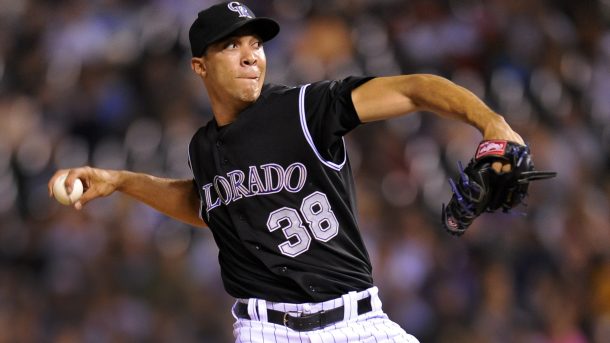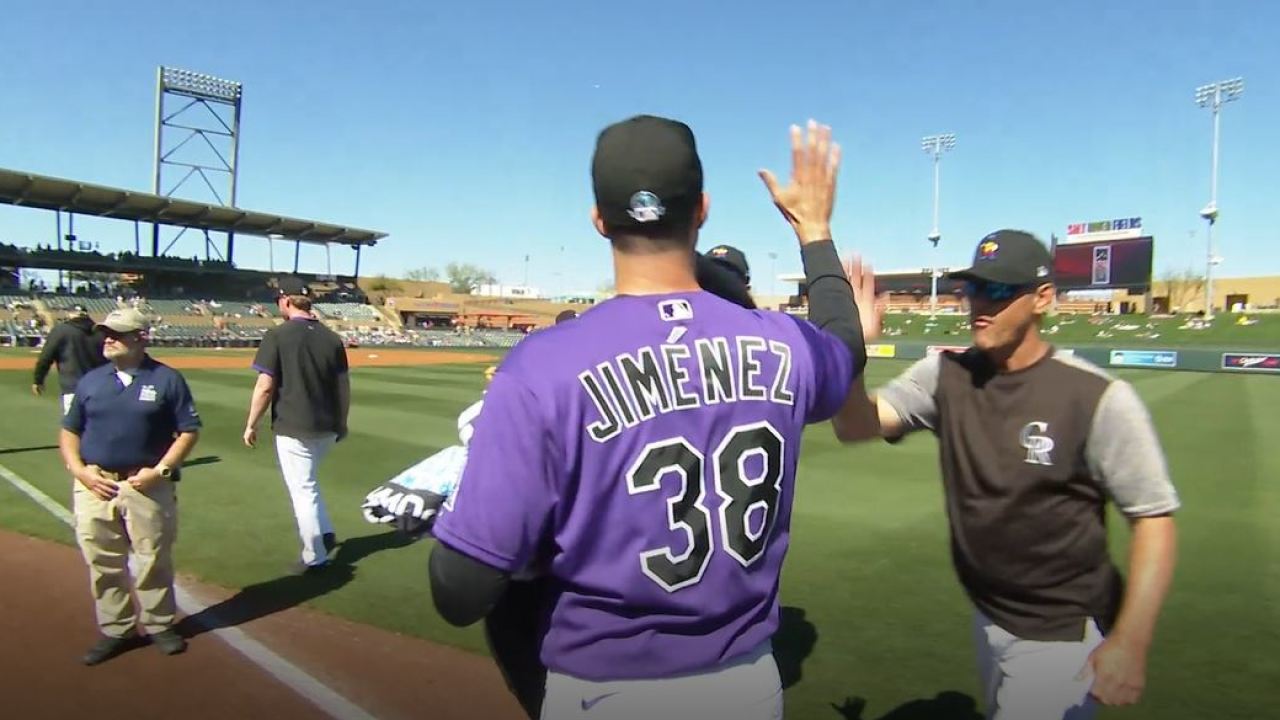© 2025 ALLCITY Network Inc.
All rights reserved.

The mountaintop. The pinnacle. The apex. The peak. The zenith.
In sports, these words are used to describe the rarest of achievements. Why? Because all the way at the top, there is only room for one.
And in the history of the Colorado Rockies, there has been one – and only one – pitcher to complete a nine-inning baseball game without surrendering a hit.
On April 17, 2010, Ubaldo Jimenez twirled one of the finest gems a purpler has ever twirled. Most fans who saw it remember the most poignant details as if the game had taken place on a sandlot field across from their home on a lazy summer afternoon.
Those who only reported on it, heard about it, or caught the highlights, probably think of it as one of the stranger no-hitters in the history of Major League Baseball.
Jimenez walked six batters, seemed to be flirting with disaster in the early innings, had thrown as many balls as strikes midway through the game, needed two or three phenomenal defensive gems to help him out, and only struck out seven Braves.
This historic turn is worthy of examining deeply through three questions and three what if scenarios.
Was this a fluke?
When taking the widest angle view, Jimenez didn’t end up having the career it looked like he was going to after his first few years in Colorado. Finger blister issues plagued him through a trade and stints with Cleveland and Baltimore. In hindsight, he wasn’t one of the best pitchers of his era, he didn’t dominate this game, and it wouldn’t be too long after this moment that he was leading the league in home runs surrendered.
But it would be more than a stretch to say that his accomplishment came out of nowhere.
Going into the game, Jimenez had pitched six or more innings in 30 of his last 31 starts. Including this game, he’d add 12 more consecutive outings of six or more (of which only two were less than seven innings).
Jimenez had been making fools of seasoned hitters going back to his rookie season in which he became the most dominant starter on a team that powered to its only World Series. But 2010 was his masterpiece. He was drawing comparisons to Bob Gibson for a reason.
In fact, there are two other games from that season that various versions of Game Score say were almost as good as the no-no.
On May 13 in San Francisco, he held the Giants to four hits and two walks, striking out nine in a complete game shutout. On October 2, he struck out 10 and allowed three hits and two walks in an eight-inning shutout. Perhaps more telling than these other fine performances is the game that Baseball-Reference’s version of the metric sees as the 20th best he threw that season: On August 15 against the Brewers at Coors Field, he threw eight innings, gave up three runs on 10 hits, walked one, and struck out 10 in a winning effort.
If we want to talk about luck, how about taking a look at his 12th best game from that season?
He tossed seven innings in Los Angeles and held the Dodgers to only a pair of hits. He did walk four, but the only run that scored was on a seeing-eye single thanks to a hit and run. That literal bad bounce ended up saddling Jimenez with his only loss of the first half.
Ubaldo was throwing 99-MPH fastballs with six inches of left-to-right bite and sink. He broke off a disgusting 12-6 curveball, a wicked slider that could touch 92 and a split-finter fastball that fell off the table at 89 MPH. That’s why he carried an ERA under 1.00 through most of the first half of the season. That’s why he started the All-Star Game for the National League. And that is why he tossed a no-hitter the Atlanta Braves, featuring multiple All-Stars and at least one Hall-of-Famer, in April of 2010.

So… what about all those walks?
Ok. Walking six dudes is not ideal. To frame it this way is to look at it backwards.
Yes, if we are just reading box scores, the big walk total is most what makes this game one of the least impressive in a category of inherently impressive accomplishments.
But isn’t it kind of amazing that this guy was able to pitch nine innings without giving up a hit when he clearly didn’t have his best stuff?
As discussed above, he was a few bouts of good fortune away from throwing no-hitters on several other occasions or would have looked far more dominant in the history books. There is a certain cosmic irony in that he was arguably more impressive in other games this season, producing a greater percentage of swings and misses on perfectly executed pitches.
While it absolutely has a flavor of “effectively wild” to it, the game is also a perfect display of how truly unhittable his stuff was, even if it was missing spots by feet and not inches at times.
Two of the walks were also borderline. Just sayin’.
It’s an ugly spot on the scorecard and it created an intensity to the first five innings that you don’t typically find in games that end the way this one did, but don’t let the walks fool you into believing that Jimenez didn’t earn his piece of history that day.
How much credit goes to Bob Apodaca?
A lot.
One of the fun things about history like this is that you never know for sure how it would have worked out if it had gone the other way.
If pitching coach Bob Apodaca hadn’t suggested that Jimenez pitch out of the stretch, even with no runners on base, beginning in the sixth, we might not be having this discussion. If he had done what he did and Ubaldo blew the no-no, he might’ve gone down as one of the most hated men in Rockies history.
He would have been the guy who got into the pitcher’s head and ruined this moment, leaving Colorado alongside San Diego as the only franchises to never write the words “no-hitter” into the history books.
But it all worked out.
The post hoc evidence is simply too strong to ignore. After escaping a jam in the fifth, Jimenez made the adjustment his coach suggested and for the rest of the game issued just one more walk, the only baserunner he would allow. The swings got uglier and uglier, more and more desperate.
He didn’t just have hitters flummoxed. He also had them beat. And once he locked in the one blemish in his game, it was over.
What if… Dexter Fowler doesn’t make that catch in the 7th?
This one is simple. If Fowler doesn’t chase down a liner in the left-center field gap off the bat of Troy Glaus, this is just another pretty good game for Ubaldo Jimenez is a season, and early career, full of them.
Almost every no-hitter or perfect game in recent memory comes with a play like this that, had it not been made, would not have resulted in such history.
What if… Miguel Olivo doesn’t bail him out in the third?
The top of the third ended when catcher Miguel Olivo picked off opposing pitcher Kenshin Kawakami out at second base. It is rare to see someone get nabbed in this fashion at the MLB level and rarer still to see pitchers getting overly aggressive on the base paths.
Still, it was yet another sign that the Braves felt a need to push the issue with Jimenez on the hill as a single in this spot with Chipper Jones at the plate could have been their best chance to score. So, Kawakami took a big secondary lead and stepped toward third as Jimenez was falling behind in the count to one of the greatest hitters of the era. And Olivo made him pay for it.
He unleashed a dart to second to end the jam.
While this didn’t have the same direct impact of the Fowler grab where you can logically conclude that if the ball dropped, the no-hitter could have easily ended. It’s easy to see a scenario where Jones blows the whole thing up early if not for this play. Or, with the command struggles, Jones could have taken a walk, loaded the bases, and extended things even further for Jimenez who needed 128 pitches to finish the game.
You have to work a bit harder at it, but you can make a strong argument that the Olivo play was just as integral as the Fowler one.
What if… Troy Glaus puts the ball in play?
Here is maybe the most fascinating question.
In the fourth, Jones led off with the base on balls. Then, Jimenez balked. Brian McCann ground out to first, moving Jones to third with one out.
Glaus, who is all over the story of this game, had a chance at that point to drive in a run without actually getting a hit. The Rockies, up by four runs, didn’t need to bring the infield in so a decently struck ball to just about anywhere on the diamond would have plated a run.
Sure, many things could have changed from that point. But if we assume the rest of the game still played out as is, taking away a gorgeous strikeout of Glaus in this situation and replacing it with a weak grounder to short would have accomplished the rare feat of throwing a no-hitter while allowing a run.
It’s almost amazing this didn’t happen.
Considering the frustrating history of the Rockies when it comes to getting national recognition – even many elements of this game that we have discussed – it is a borderline miracle that Jimenez struck out Glaus with some filthy splitters and sliders to avoid further scrutiny of his achievement.
On the Mountain Top
So, there he stands. Still. Alone.
Some have come close. Jon Gray spun arguably the best game in franchise history, at least according to Baseball-Reference’s Game Score. On September 17, 2016, in his rookie year, he struck out 16 Padres and allowed just four singles without walking a batter.
German Marquez had one almost as good – better depending on who you ask – in San Francisco last season when he allowed just a lone baserunner on a single. He struck out nine.
But he did allow that single. And despite the insane strikeout total and the fact that the Gray Wolf was so monstrous at Coors Field, he did allow those four hits.
In the book of the Colorado Rockies, there is a page about halfway through titled “No-Hitters” with a single name written in it: Ubaldo Jimenez.
That is, until someone else comes along and writes their’s next to his.

Comments
Share your thoughts
Join the conversation



